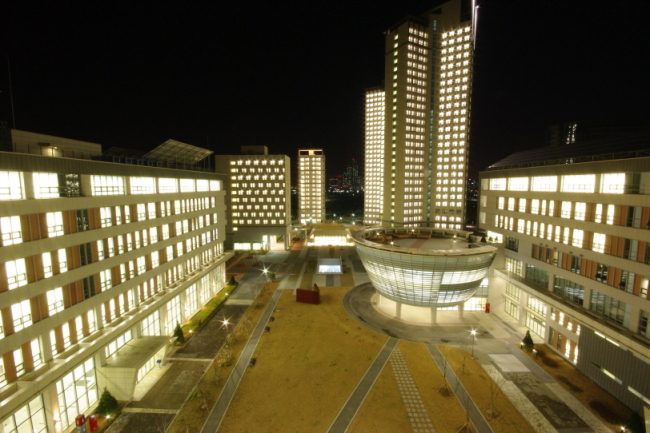Korea widens door for foreign colleges
Measures to lure foreign investors spark both expectation and concern
By Yoon Min-sikPublished : Aug. 21, 2014 - 20:37
The Education Ministry recently announced a plan to boost investment in education by lowering the threshold for foreign investors, a move widely interpreted as an open invitation for schools outside Korea to expand here.
The focal point of the measures, unveiled last week at the government’s meeting for the trade and investment promotion committee in Seoul, is to establish a community of international higher education institutes in Songdo, Incheon.
In order to do so, the government will allow joint investment of foreign and domestic institutes in establishing branches of foreign schools in the Songdo Global University Campus. Previous regulations limited the participation of local corporations in investing in such schools.
“Negotiations to host three prestigious colleges (in Songdo) are underway. The government also plans to increase the subsidy for education institutes with excellent performance, providing incentives for the schools to invest in Korea,” an Education Ministry official said.
According to the ministry, the Fashion Institute of Technology at State University of New York and other specialized colleges are interested in expanding to Korea. The officials at SUNY Korea said the negotiation process was underway but declined to comment on the specifics.
SUNY Korea is among the five higher education institutes that have already set foot here.
The focal point of the measures, unveiled last week at the government’s meeting for the trade and investment promotion committee in Seoul, is to establish a community of international higher education institutes in Songdo, Incheon.
In order to do so, the government will allow joint investment of foreign and domestic institutes in establishing branches of foreign schools in the Songdo Global University Campus. Previous regulations limited the participation of local corporations in investing in such schools.
“Negotiations to host three prestigious colleges (in Songdo) are underway. The government also plans to increase the subsidy for education institutes with excellent performance, providing incentives for the schools to invest in Korea,” an Education Ministry official said.
According to the ministry, the Fashion Institute of Technology at State University of New York and other specialized colleges are interested in expanding to Korea. The officials at SUNY Korea said the negotiation process was underway but declined to comment on the specifics.
SUNY Korea is among the five higher education institutes that have already set foot here.

Authorities also vowed to enhance the level of interaction among universities at Songdo. The plans include allowing students to freely take high-quality classes at other universities and acquire college credits for it.
In addition, the ministry said it planned to amend the law related to foreign-based schools so that they are not discriminated against. Foreign-based schools in Korea are excluded from many of the laws on private schools and higher education institutes to guarantee their autonomy.
A side effect of that policy is that schools and students miss out on many of the benefits as well. For example, most male students attending higher education institutes in Korea may postpone their mandatory military service until they finish their education.
But students attending foreign universities in Korea have a hard time postponing their service, as such institutes do not qualify as Korean universities. The Education Ministry plans to make revisions to clauses concerning military service by December, according to officials.
The ministry will also issue D-4 visas for general training to students attending private education institutes, if the schools have the capability to manage foreign students. D-4 visas have been issued mostly to students at university-affiliated institutes, or national or public institutes.
To prevent the rampant inflow of colleges, the government will only permit prestigious institutes ― for instance, colleges that are in the top 50 of world renowned university ranking systems ― to come to Korea.
But the government plans have sprouted concerns of adverse effects, such as the rising tuition of higher education institutions.
“Some of the colleges seeking to enter Songdo are not that prestigious, but have steep tuition fees. I think the government is just viewing colleges as a means to make more money,” said a professor at a Seoul-based university.
Contrary to the ministry’s claims to only host top-notch schools, many of the foreign universities in Korea or attempting to enter are ranked around 100th or lower.
Most of the foreign-based universities in Songdo have annual tuition fees of around $20,000, which is considerably higher than the average annual tuition of Korean universities at 6.67 million won ($6,512).
For comparison, a student would have to pay roughly twice the amount he or she would pay for Yonsei University ― whose yearly tuition is the highest of all Korean universities at 8.67 million ― for a year of classes at George Mason University in Songdo.
“Allowing domestic and foreign corporations to jointly invest in these institutes effectively allows major corporations in Korea to use schools for profit-seeking,” the Korean Teachers and Education Workers’ Union, one of the largest unions of teachers here, said in a statement. “Far from achieving its initial goals, the ministry’s measures will lead to schools being forced to fight over money.”
Education circles also expressed concerns at the lenient visa policy, saying that allowing even private institutes to host foreign students will reduce the quality of education throughout Korea.
By Yoon Min-sik (minsikyoon@heraldcorp.com)




















![[Today’s K-pop] BTS pop-up event to come to Seoul](http://res.heraldm.com/phpwas/restmb_idxmake.php?idx=642&simg=/content/image/2024/04/17/20240417050734_0.jpg&u=)